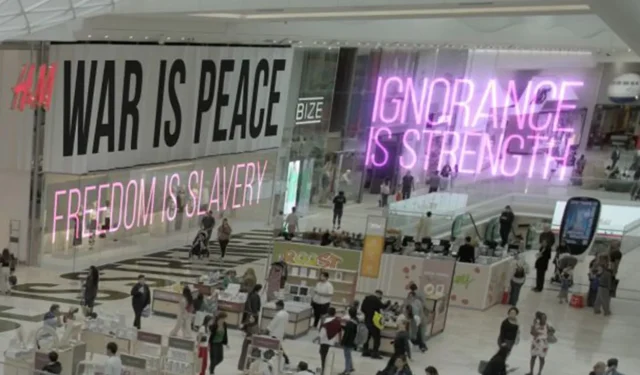Exploring George Orwell’s Timeless Relevance in Raoul Peck’s Documentary
George Orwell’s influence has fluctuated over the years, but his powerful critiques of imperialism, power, and totalitarianism remain crucially relevant. This is especially true for his seminal work, 1984, which serves as a pivotal reference in Raoul Peck’s documentary, Orwell: 2+2=5. Released 76 years after its initial publication, the film provides an insightful biographical and intellectual examination of Orwell, especially in light of the recent reelection of Donald Trump, an event that underscores the documentary’s timely urgency.
Peck, who previously directed the acclaimed film I Am Not Your Negro, channels a thoughtful yet passionate energy in his portrayal of Orwell. The documentary effectively combines a wealth of archival material with new footage, presenting an engaging mix of documentary clips and dramatizations, including adaptations of both 1984 and Animal Farm. Among its standout features are striking graphics, such as a list of banned books and a real-world glossary of Newspeak, both of which enhance the viewing experience and provide context for Orwell’s work.
The documentary highlights key moments that shaped Orwell’s political consciousness. His tenure as a police officer in British-occupied Burma (now Myanmar) sparked a profound awakening to the “unjustifiable tyranny” of imperialism. Furthermore, his background as a member of Britain’s “lower upper middle class” gave him a unique perspective on the effects of social hierarchy on identity.
Peck’s footage from the rugged Scottish island of Jura, where Orwell spent his last years, adds a poignant layer to the narrative. Here, the ailing author raised his son and penned Nineteen Eighty-Four shortly before his untimely death from tuberculosis at 46. This setting underscores the solitude and struggle that were prominent in Orwell’s life, allowing viewers a glimpse into his creative process.
Orwell’s reflections on his role at the BBC during the war resonate with journalists today, revealing the complex relationship between media and government. He noted, “Don’t think I don’t see how they are using me. But while here, I consider I have kept our propaganda slightly less disgusting than it might otherwise have been.” This sentiment captures a prevalent tension that continues to affect media professionals in the contemporary landscape.
Central to Peck’s documentary—and to Orwell’s oeuvre—is the intricate interplay between media and authority. In 1984, the Ministry of Truth continuously alters historical narratives, and Newspeak manipulates language to obscure truth. The film presents a compelling array of Orwell’s “prefabricated” language—terms that dilute political discourse such as “collateral damage” and “peacekeeping operations” —demonstrating how modern political rhetoric often mirrors Orwellian themes.
However, some critiques of the film suggest it does not fully reach the depth of Orwell’s insights. The selection of examples often adheres to contemporary partisan viewpoints, despite featuring timeless observations on propaganda. Orwell wisely commented, “Everyone believes in the atrocities of the enemy and disbelieves in those of his own side, without ever bothering to examine the evidence.”
Personally, I have gleaned from Orwell, and a lifetime of observing political cycles, that whichever faction of the American political landscape justifies its actions in our ongoing conflicts, deception is likely at play. Orwell’s insights remain relevant to all, transcending the obvious authoritarians and their followers. While Peck may lean toward a particular ideological stance focused on anti-Trump sentiment, this approach risks oversimplifying a complex narrative. Moments that connect the past with present chaos, such as the public executions of Nazis in Ukraine versus the January 6 Capitol unrest, could have benefitted from a more nuanced presentation.
Despite its shortcomings, Orwell: 2+2=5 is an essential documentary. Eric Arthur Blair, known as George Orwell, was driven by a profound sense of injustice and a commitment to truth. By illuminating Orwell’s enduring words and framing them in a contemporary context alongside other dissenting voices, Peck delivers a sobering reminder of the stakes involved in our age, defined by doublethink and thoughtcrime—conditions Orwell foresaw and we still navigate today.


